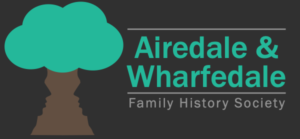The Airedale & Wharfedale Family History Society met at the Salem Church Hall on Thursday 2 May. Following a brief AGM for the newly formed Society Chairman Lynda Balmforth welcomed popular speaker Jackie Depelle who presented an illustrated talk ‘Which Website and Why?’.
Inspired by Sunny Morton from a RootsTech conference Jackie led us through the pros and cons of various popular family history websites. RootsTech is an annual family history conference held in Salt Lake City and will also be held in London in October 2019. Helpful videos and other downloads are available on their website.
Some basic things to consider when using the internet websites for family history research are cost, ease of use (can you download to your ipad or mobile?), the amount and quality of available data and coverage (place and time) and the availability of family tree building tools. An essential starting point for family historians is information on births, marriages and deaths and these are available from the following free websites[i]: freebmd.org.uk; gro.gov.uk; ukbmd; familysearch.org; irishgenealogy.ie and scotlandspeople.gov.uk. They are also available on the main two subscription websites findmypast.co.uk and ancestry.co.uk (which can be accessed for free in some libraries). Freebmd provides a reliable dual input transcription by volunteers for births, marriages and deaths in England & Wales for the years 1837 to 1983. It should be borne in mind that transcriptions of original records can differ between websites and it can be helpful to view an image of the original record where this is available. Gro provides births 1837 to 1917 & deaths 1837 to 1957 but not marriages. Importantly this site also provides mothers’ maiden surnames as well as age at death.
Ukbmd.org.uk is an umbrella site and areas of coverage are explained; where parish records (England & Wales) are available these are original records and not transcriptions so can prove very useful.
Findmypast and ancestry have much overlapping information but some information such as parish records is unique to each site so you can select that which is most useful to you (check findmypast A-Z index & and ancestry card catalogue). Findmypast regularly adds new data which it informs users about on a weekly basis. Scotlandspeople provides valuable information for Scottish ancestry but is only available on a pay per view basis rather than subscription. Irishgenealogy has limited coverage due to the loss of many records.
Census information from 1841 to 1911 is another main tool for family historians and transcriptions plus original images are available on the main subscription sites findmypast & ancestry plus scotlandspeople and nationalarchives.gov.uk (which has some 2500 archives available to be searched).
Thegenealogist.co.uk provides unique access to the tithe collection & the 1910 valuation office survey; britishlibrary (bl.uk) can be used to identify British newspapers that may not have been digitised; and myheritage.com is useful for European & Jewish ancestry.
Lynda Balmforth gave a vote of thanks at the close. The Society’s next meeting will take place 7.30 pm on Thursday 6 June at the Salem Church Hall, Main Street, Burley when Eric Jackson will present ‘Remembrance – War Memorials & the Unknown Warrior’. Members and non-members all welcome, refreshments provided.
